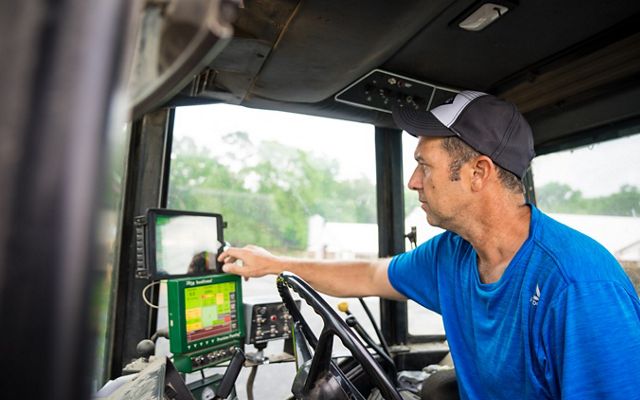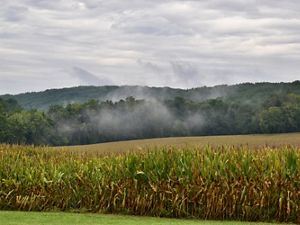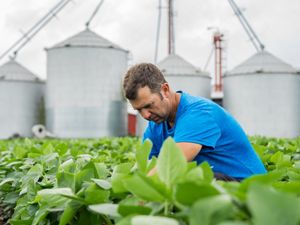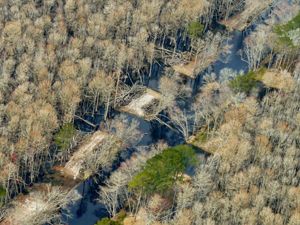Regenerative Agriculture in Maryland
Protecting clean water and resiliency to climate change and supporting a healthy Chesapeake Bay.
TNC has been working on Maryland’s Eastern Shore since the mid-1970s to protect some of the state’s most iconic habitats. During that time, TNC built a reputation of trust and respect with local farming communities. Our goal is to support an agricultural economy where farms provide healthy food, clean water and resiliency to climate change and support a healthy Chesapeake Bay where people and nature thrive.
Transforming Agriculture
Many farmers don’t own the land they work, but instead rent from landowners who do not actively farm—also known as non-operating landowners (NOLs). In Maryland, roughly 64% of all farmland is leased. NOLs and their relationships with the farmers to whom they rent land are vital to achieving wide-scale adoption of soil health and nutrient management practices across U.S. croplands and here in the Free State.
In early 2021, TNC and American Farmland Trust (AFT), hosted a workshop presenting findings from two separate surveys of NOLs and farmers that lease land in Pennsylvania and Maryland. The objectives of the workshop were to discuss opportunities in the areas of policy, outreach, education and incentives for strengthening leasing relationships of NOLs and leasing farmers and for supporting the implementation of conservation practices.
They also identified actionable next steps and partners that are interested in collaborating on future efforts. Recommendations from the workshop focused on additional needs for education and outreach resources, outreach strategies and policy and program opportunities.

Partnering to Help Farmers
In 2021, TNC and our partners wrapped up a 2017 National Fish and Wildlife Foundation-funded project that was designed to accelerate the implementation of improved fertilizer application practices that improve water quality in the Chesapeake Bay region.
This work included outreach, education and training that led to the engagement of 1,477 farmers and over 1,300 agribusiness and public sector partners with total potential exposure to over 49,000 farmers, conservation and agribusiness professionals. The project directly resulted in the reduction of an estimated 913,000 lbs of nitrogen and 23,000 lbs of phosphorus per year of implementation on 46,000 acres in the Chesapeake Bay region from the adoption of improved fertilizer application practices.
Pocomoke Restoration: Freeing a Trapped River
The 73-mile long Pocomoke River drains water from four Delmarva counties. In the mid-20th century, an 18-mile section of the Pocomoke was dredged and channelized, disconnecting the river from thousands of acres of floodplain.
To date, working with partners, TNC has restored more than 3,000 acres of floodplain wetlands which will help reduce erosion and improve water quality and habitat for wildlife and for people who depend on a healthy Chesapeake Bay ecosystem. It's one of the largest ecological restoration projects in Maryland's history that will see an annual reduction of 71,000 pounds of total nitrogen, 7,600 pounds of total phosphorus and 47,500 pounds of total sediment into the Chesapeake Bay.
Great Cypress Swamp: Restoration and Partnership
Building on the downstream floodplain restoration successes on the Pocomoke River, TNC led an 80-acre freshwater wetland restoration at a property owned by Delaware Wild Lands in the Great Cypress Swamp. This property, located at the headwaters of the Pocomoke River in southern Delaware and once a low-yield agricultural field, now consists of seven interconnected wetlands that create a dynamic natural habitat.
Several partners contributed their expertise, funding, oversight and design skills to make this project a great success, including Delaware Wild Lands, TNC, Ducks Unlimited and the U.S. Fish & Wildlife Service. This 80-acre restoration in the Great Cypress Swamp is now part of 3,000 restored acres of Pocomoke River floodplains and headwaters, helping to improve the health of the Chesapeake Bay.
Contact
Daniel Sweeney
Agriculture Program Director
Email: daniel.sweeney@tnc.org
Additional Resources
-
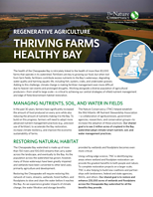
Regenerative Agriculture
The health of the Chesapeake Bay is intricately linked to the health of more than 83,000 farms that operate in its watershed.
DOWNLOAD -
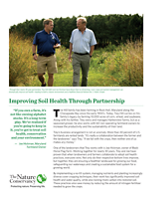
Improving Soil Health Through Partnership
When landowners and farmers collaborate to adopt soil health practices, everyone wins.
DOWNLOAD -
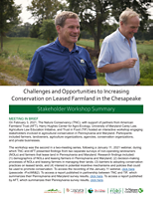
Chesapeake Bay NOL Research Insights
Findings from two separate surveys of non-operating landowners (NOLs) and farmers that lease land in Pennsylvania and Maryland examining the challenges and opportunities to increasing conservation on leased farmland in the Chesapeake.
DOWNLOAD -
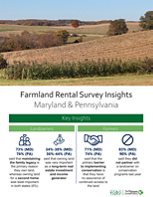
Farmland and Rental Survey Insights
Findings from surveys of non-operating landowners (NOLs) and farmers that lease land in Pennsylvania and Maryland suggesting there is potential to strengthen farmer-landowner relationships through written leases.
DOWNLOAD -
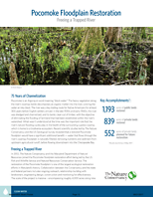
Pocomoke River Floodplain Restoration Fact Sheet
Reversing a legacy of ditching and draining to reconnect the Pocomoke River to its floodplain wetlands.
DOWNLOAD -
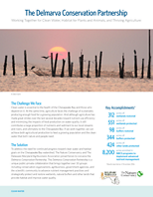
Delmarva Conservation Partnership Fact Sheet
Working together for clean water, habitat for plants and animals, and thriving agriculture.
DOWNLOAD

Stay in Touch
Sign up to receive monthly conservation news and updates from Maryland/DC. Get a preview of Maryland/DC's Nature News email.

